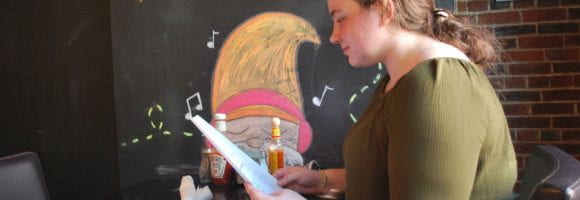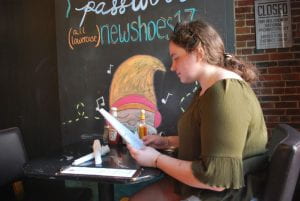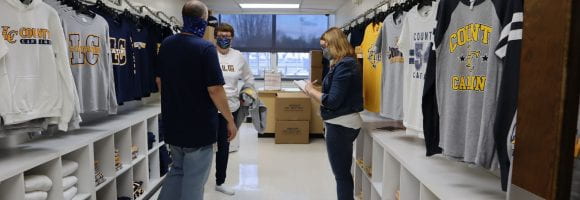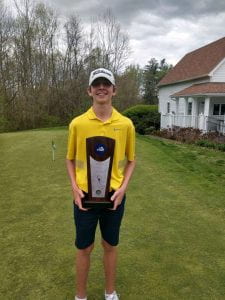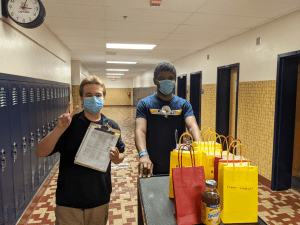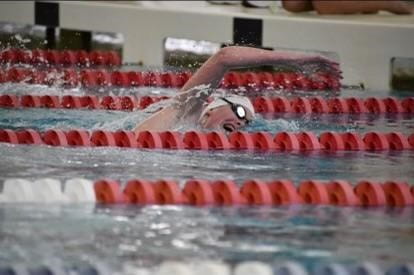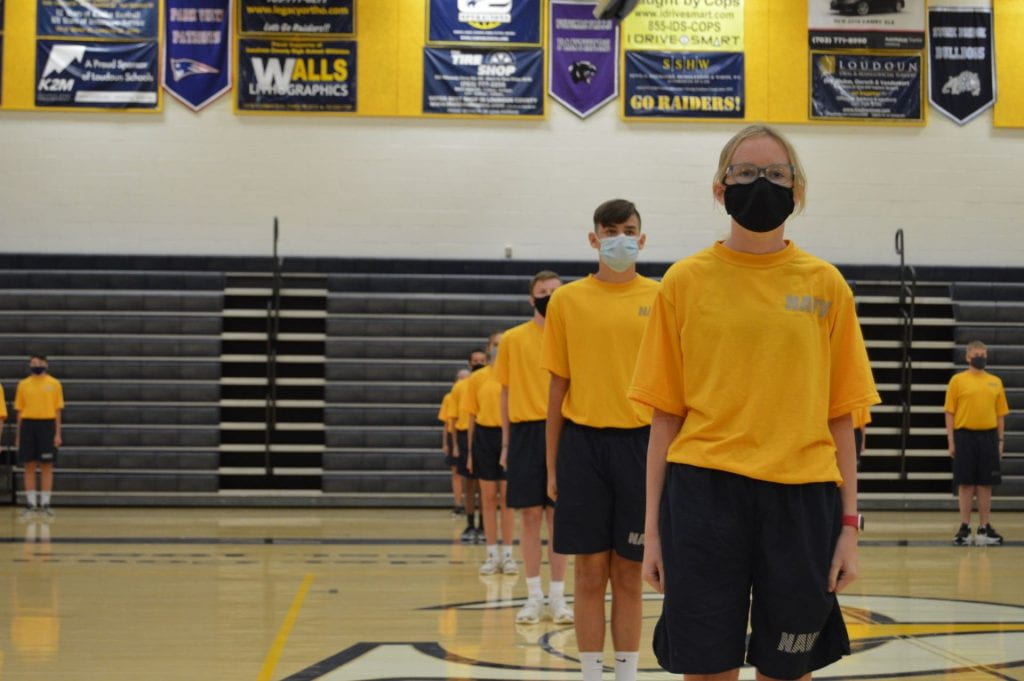Michaela Scott and Maggie Sheridan | Editors-in-Chief

El teacher Sarah Loredo teaches her hybrid students during first block. Since the switch to in-school learning was implemented in February, over 80% of EL students were brought back into the classroom. Photo courtesy of Sarah Loredo.
During the distance/hybrid school year, to say students have had obstacles to overcome would be an understatement, especially for English Language Learners. Many of these students are brand new to the country, so having to go straight to online school has introduced several challenges unique to these specific students.
Many teachers have seen firsthand the effect of distance learning on their students and have made it known that it is not easy for the students to comfortably navigate a brand new way of learning.
“The technology piece is definitely the most significant,” English Language teacher Erin Mclaughlin said. “From a teacher perspective we are all new to this so we’re learning while teaching. From a student perspective, they had to learn a totally new system of learning for the first time in their homes with zero help, plus Schoology is in English.”
Several of the English Language Learner teachers emphasized the amount of class time that was consumed by each problem they ran into trying to help out the EL students. On the other hand, general education teachers couldn’t always find the time during class to instruct their EL students individually while teaching dozens of general education students.
“I think the stress for GenEd teachers is very high this year. General Education teachers have to manage so many components of teaching that as an EL teacher, we’re only focusing specifically on EL students, instead of a mixture,” Mclaughlin said. “Whereas in an all EL class we would have to go through each individual student to walk them through their assignments, and so if you have 10 students in a classroom, you’re taking away the first 30 minutes for weeks because they don’t remember right away.”
Overall, the GenEd and EL teachers have explained that the technology aspect is the most crucial part of this learning experience, and it had an impact on the school year involving things like attendance, access to assignments, and testing.
“During distance learning I have struggled with making sure these students have equitable access to technology,” Biology teacher Kayla Urban said. “Attendance has also been a struggle. Many of my students have many responsibilities such as working a job, looking after others, and also having access to reliable internet and a private place to work.”
Urban has worked with these students for eight years and has grown familiar to them. This will be her fourth year teaching some EL students in a separate, self-contained course. She said participation was a struggle for these students at the start of the year.
“It’s harder to reach those students at home because they do not have their cameras on and I can’t see what they’re doing or what’s happening at their house, even if they’re at their computer. You have students that just log in and never give any responses, so it’s hard to tell if they’re struggling because they don’t understand the material or if they’re just playing a video game, or if they’ve just been going through a hard time due to the pandemic,” Urban said.
English Language teacher Sarah Loredo explained that students are used to one-on-one contact, or small group instruction to understand the material given to them. Although break out rooms are an option, it isn’t the same as when students are physically present to ask for help from teachers or use class resources.
“Students learn a lot visually, so technology is good for that, but it is not as organic as the need happens immediately and you can easily pick up a book or a piece of paper,” Loredo said. “Learning can be so much quicker and more efficient when all the resources are available to the students.”
Urban was concerned with the fact that students appeared hesitant to speak up when they were confused or had a question over the Google Meets. “They are scared to comment or ask questions online because they feel as though the spotlight is totally on them in the meeting and it is recorded. We have told them they can always ask us through Remind as well as emails or breakout rooms so it’s private,” Urban said.
In order to help the adjustment with distance learning, Urban has used new programs and incorporated them into her classes, such as Desmos. “It is very helpful in order to control the pacing. It also makes everything more interactive and I can see everyone’s participation. I can also make it anonymous so I can talk about certain student’s responses without them being embarrassed by their wrong answers in front of the class,” said Urban.
Additionally, Loredo explained the challenges specifically for students who are on a level one in EL and are not participating or speaking up during class time. There are six levels to becoming fluent, and English is usually nonexistent for students on level one. “The students who just started, and are on level one, I cannot even imagine them being new to the country and learning how to navigate the technology, testing, copying something from Google, writing an email, completing assignments,” Loredo said. “Due to this learning curve, we have worked even harder to give them the support they need because we want them to be successful.”
Over the course of the year, EL students have been gradually coming back; beginning in October, LCHS was only allowed to bring the level one students back, which was 15 students. “We would have students that didn’t qualify as level one coming to the front of the building and asking to be let in,” Mclaughlin said. “We had a lot of our students who wanted to be here, but they couldn’t.”
Since the switch to hybrid was implemented in February, over 80% of El students were brought back into the building. “All of my students are here except for two and that is amazing, I am so happy about that,” Loredo said. “In-person school makes things a lot easier and better for the students.”
Although learning at home was a challenge, Urban agrees that having students back in the building has helped their learning and understanding. “I think it definitely helps now that we are back in the building and we are able to support more students. I have had more students return to school in my self-contained ELL biology than I have had in any of my other classes,” Urban said.
She has also been able to use more resources in order to help them and make them more comfortable in the classroom. “It has been really good for students to come back because I am able to provide more hands-on manipulative resources for them, which are important when you come to a place where you do not understand the language,” Urban said.
Although distance learning has introduced a variety of obstacles for EL students, EL and GenEd teachers have developed strategies and new ways of teaching to make learning a better experience for these students. “We want to do what is best for our students, and I’m happy I was able to support them throughout this year.”
